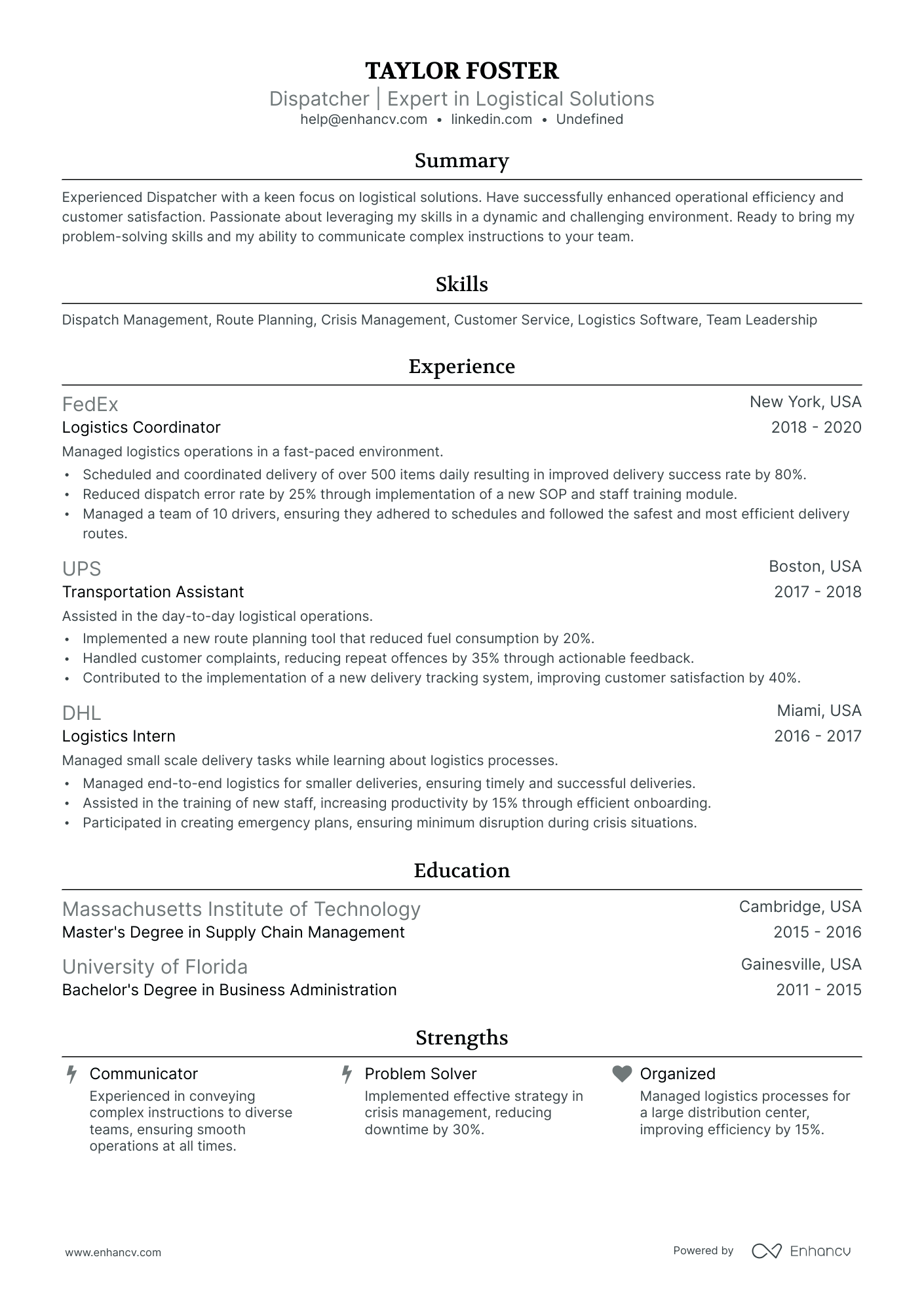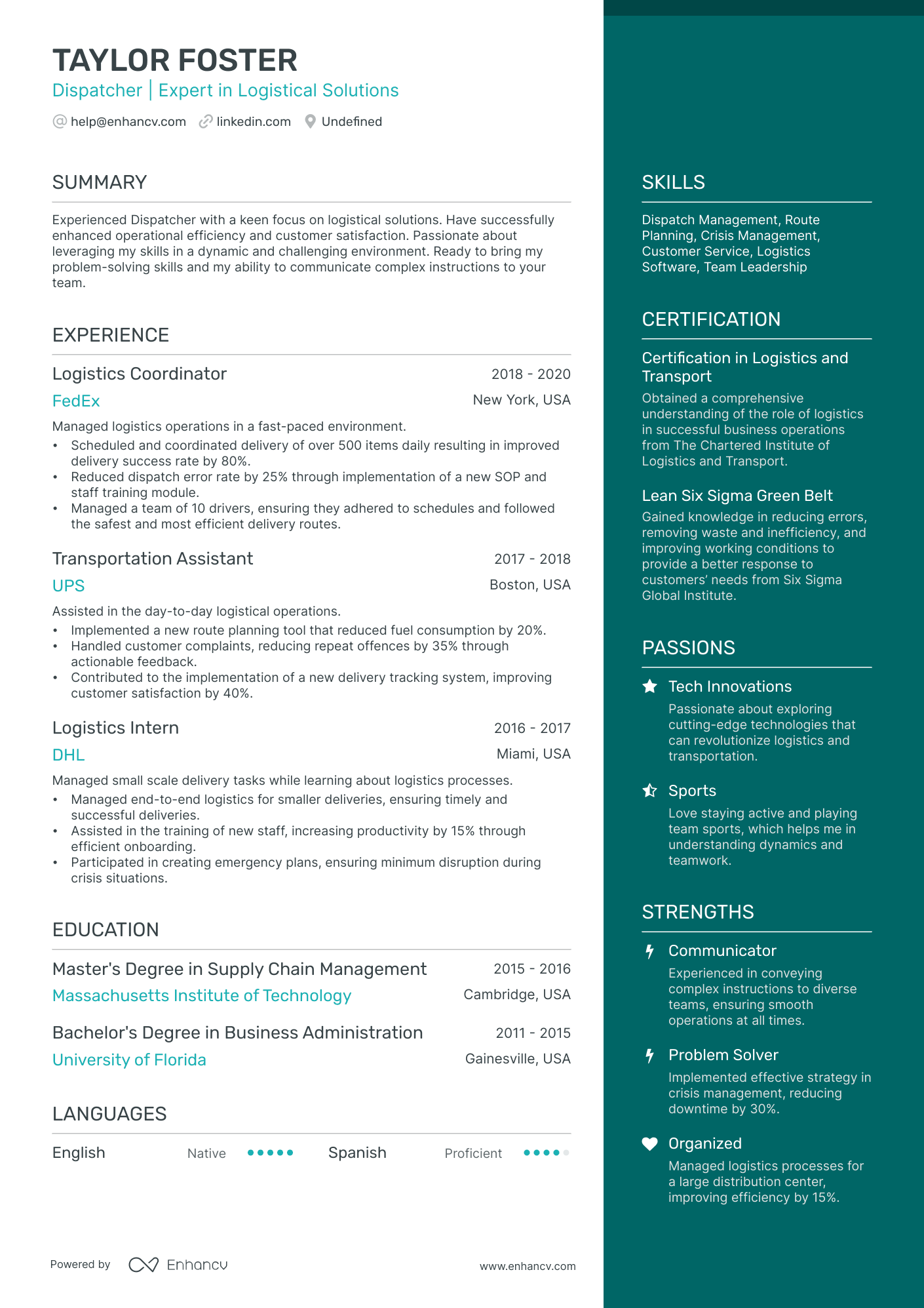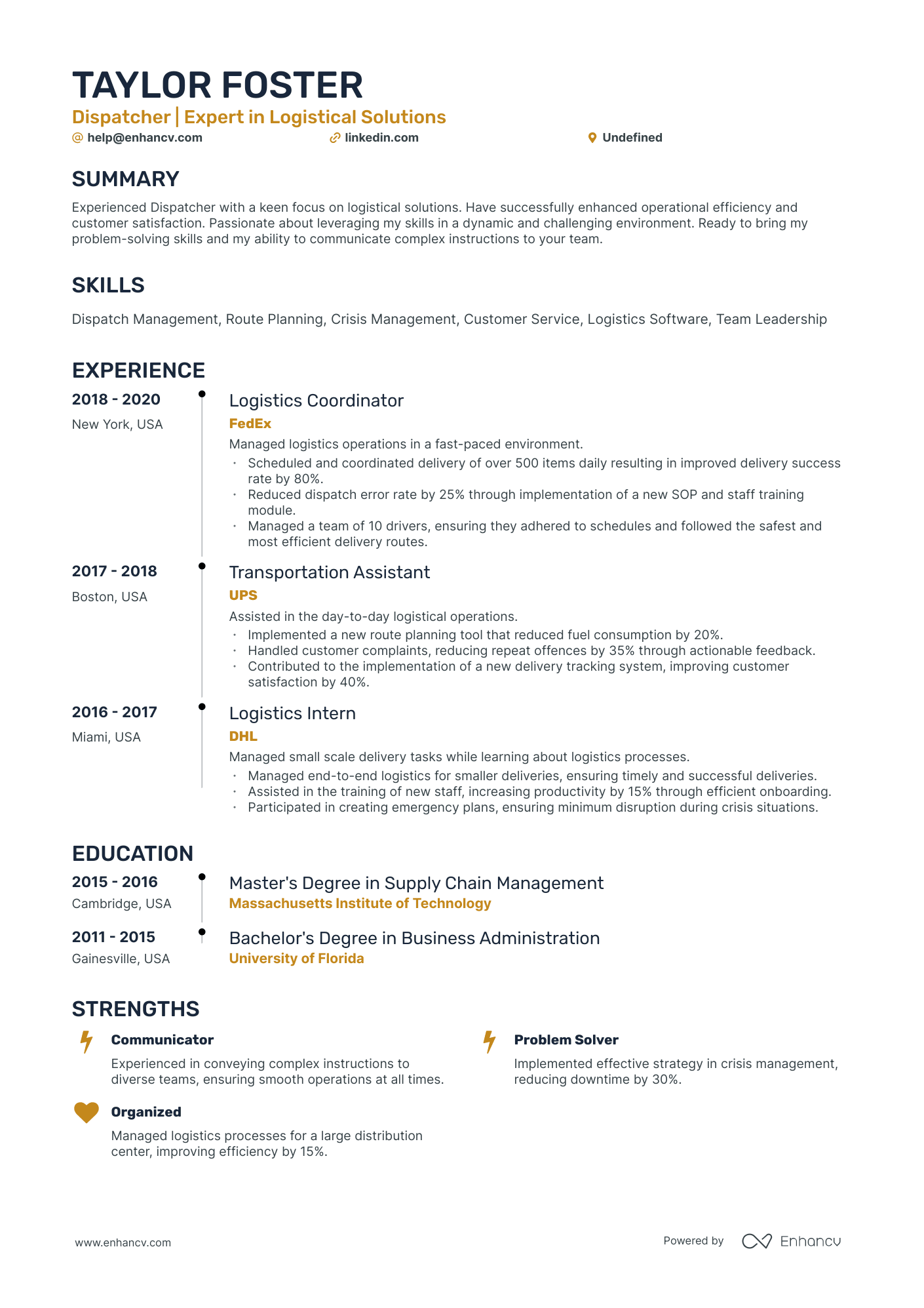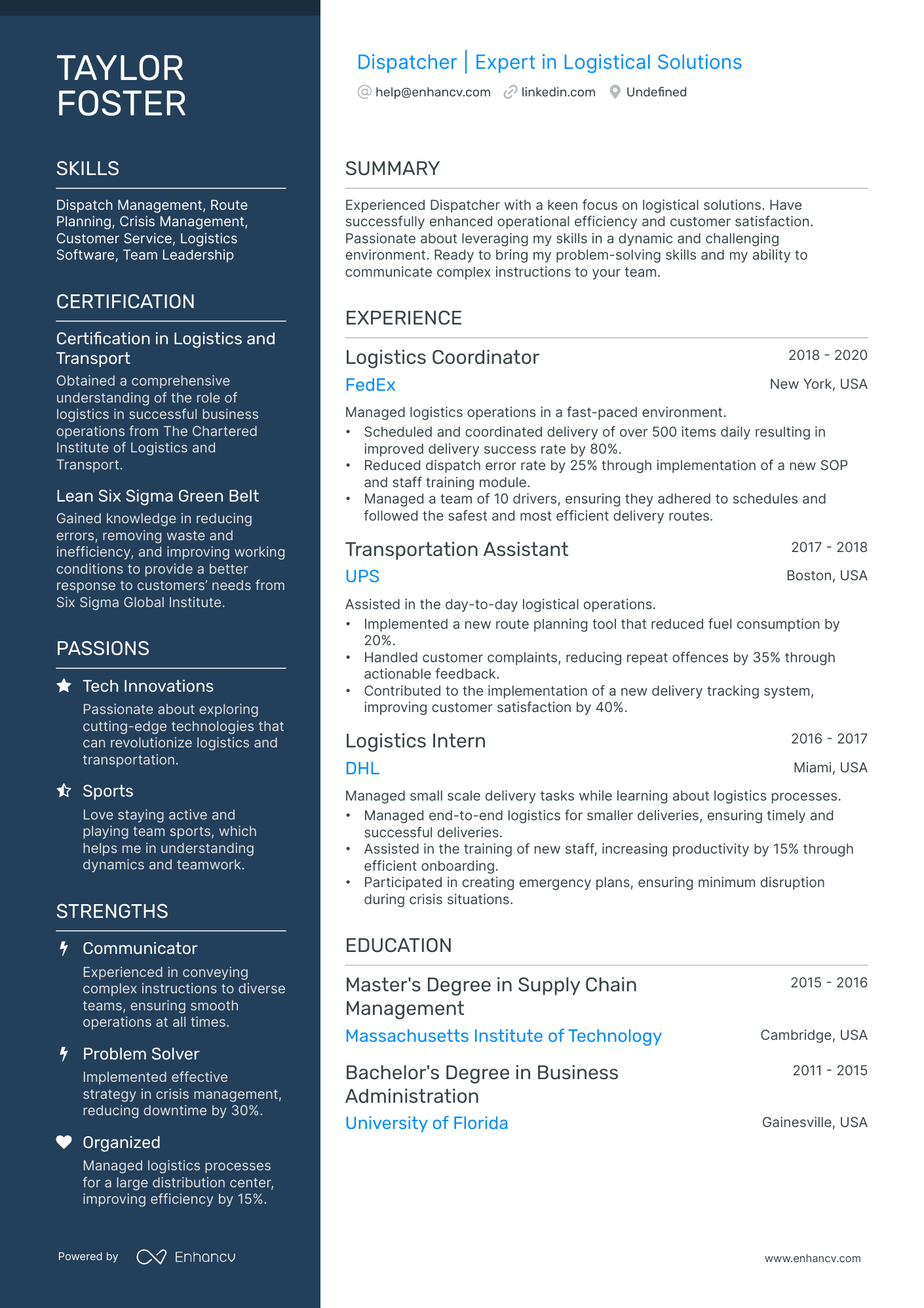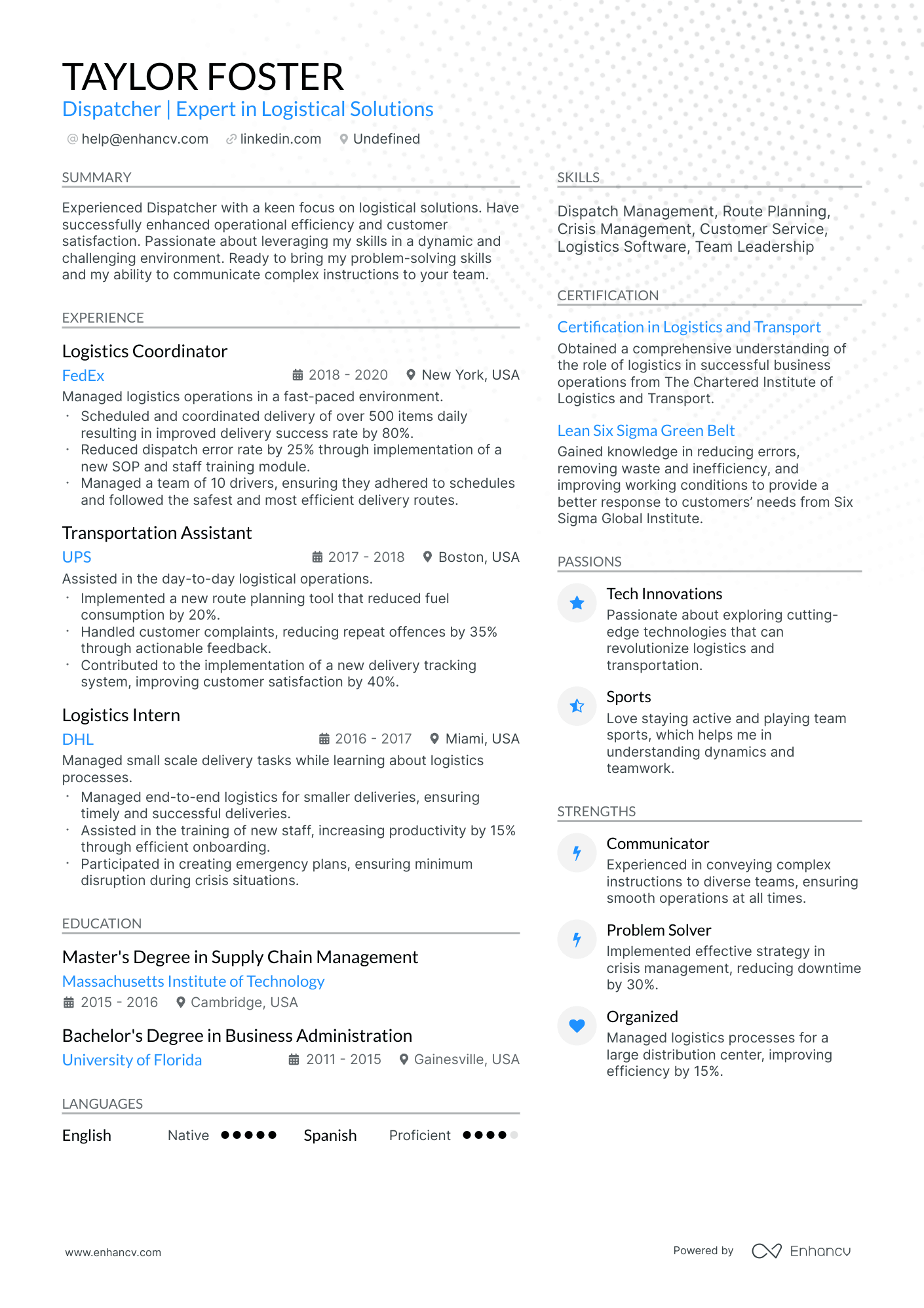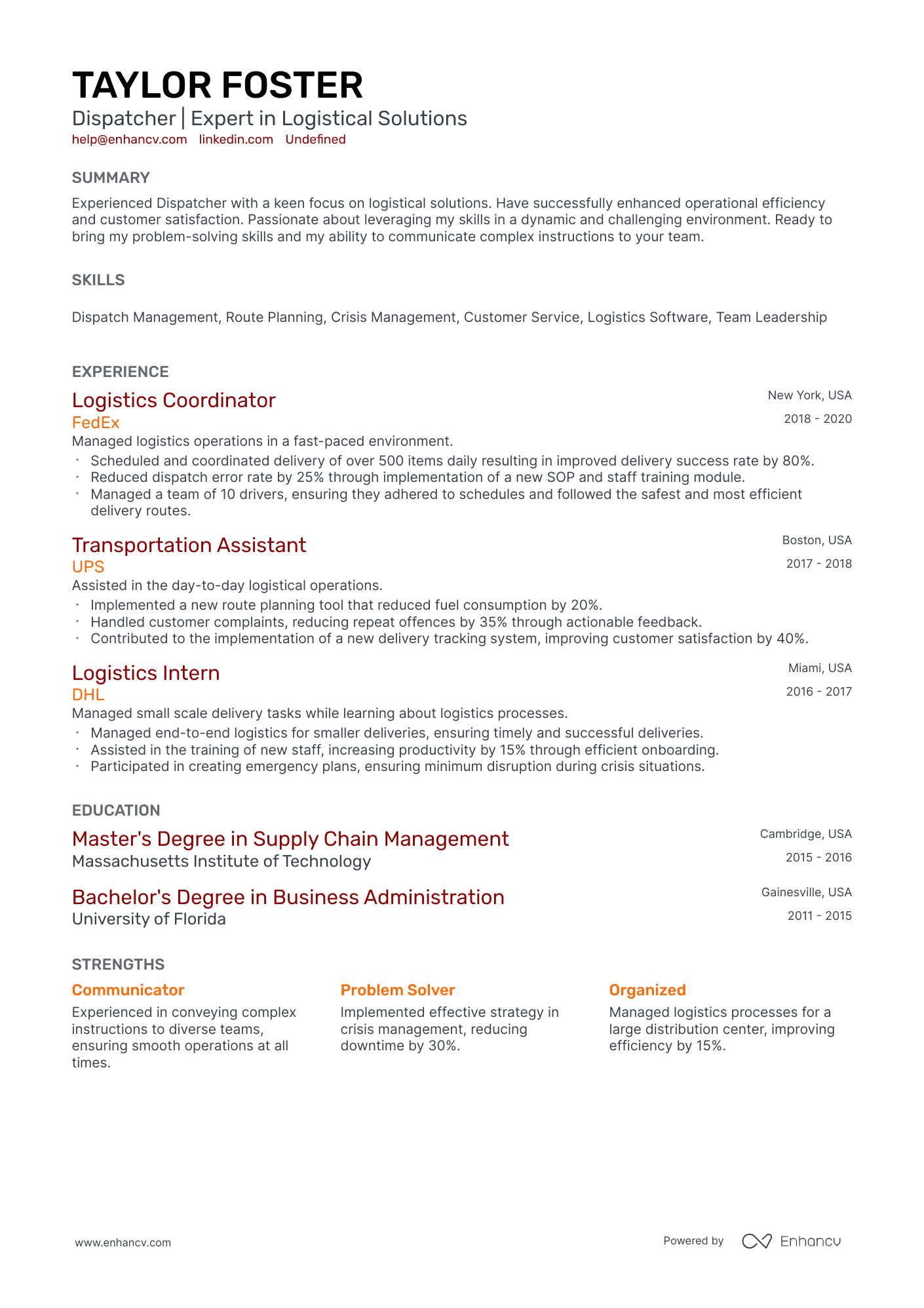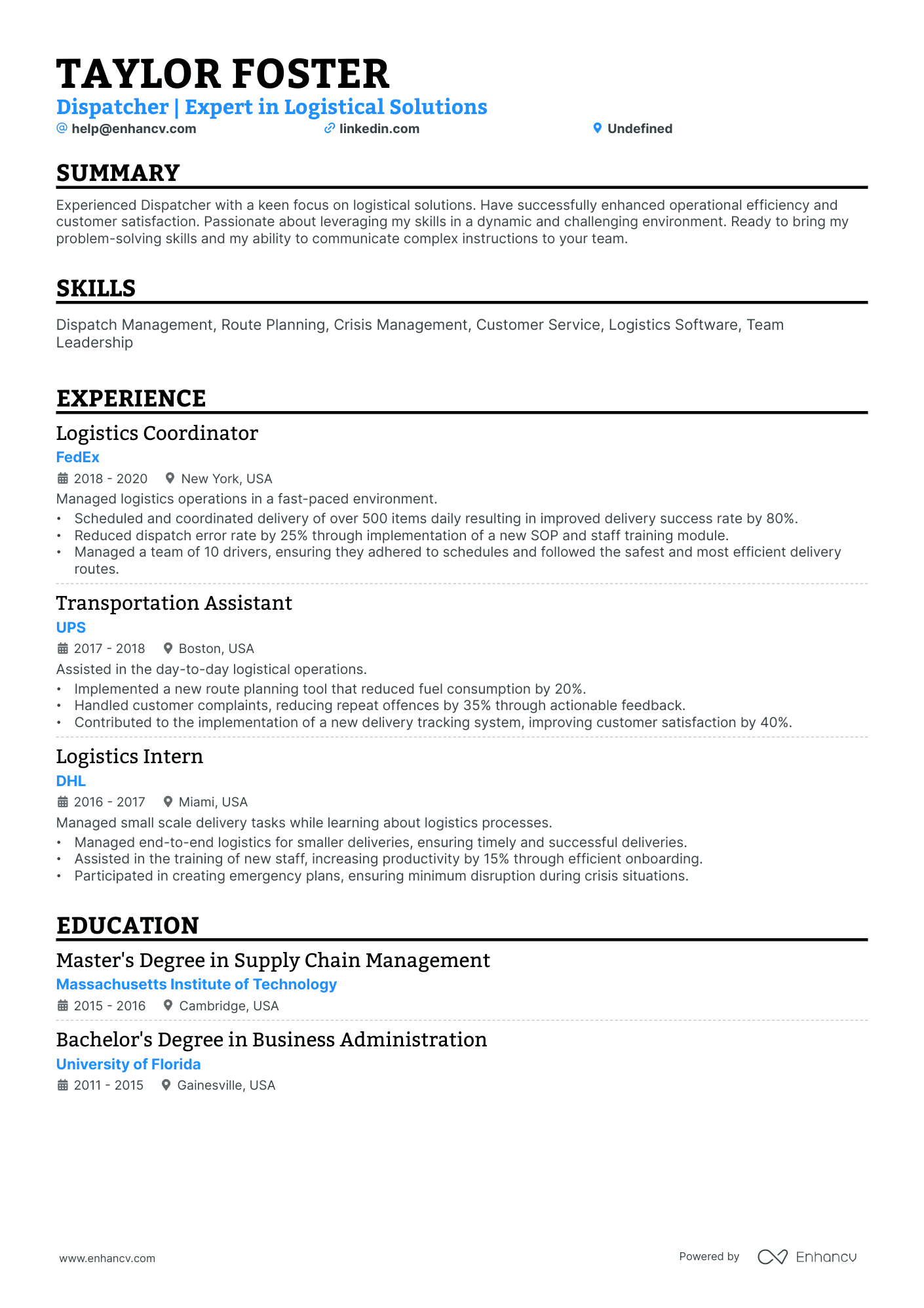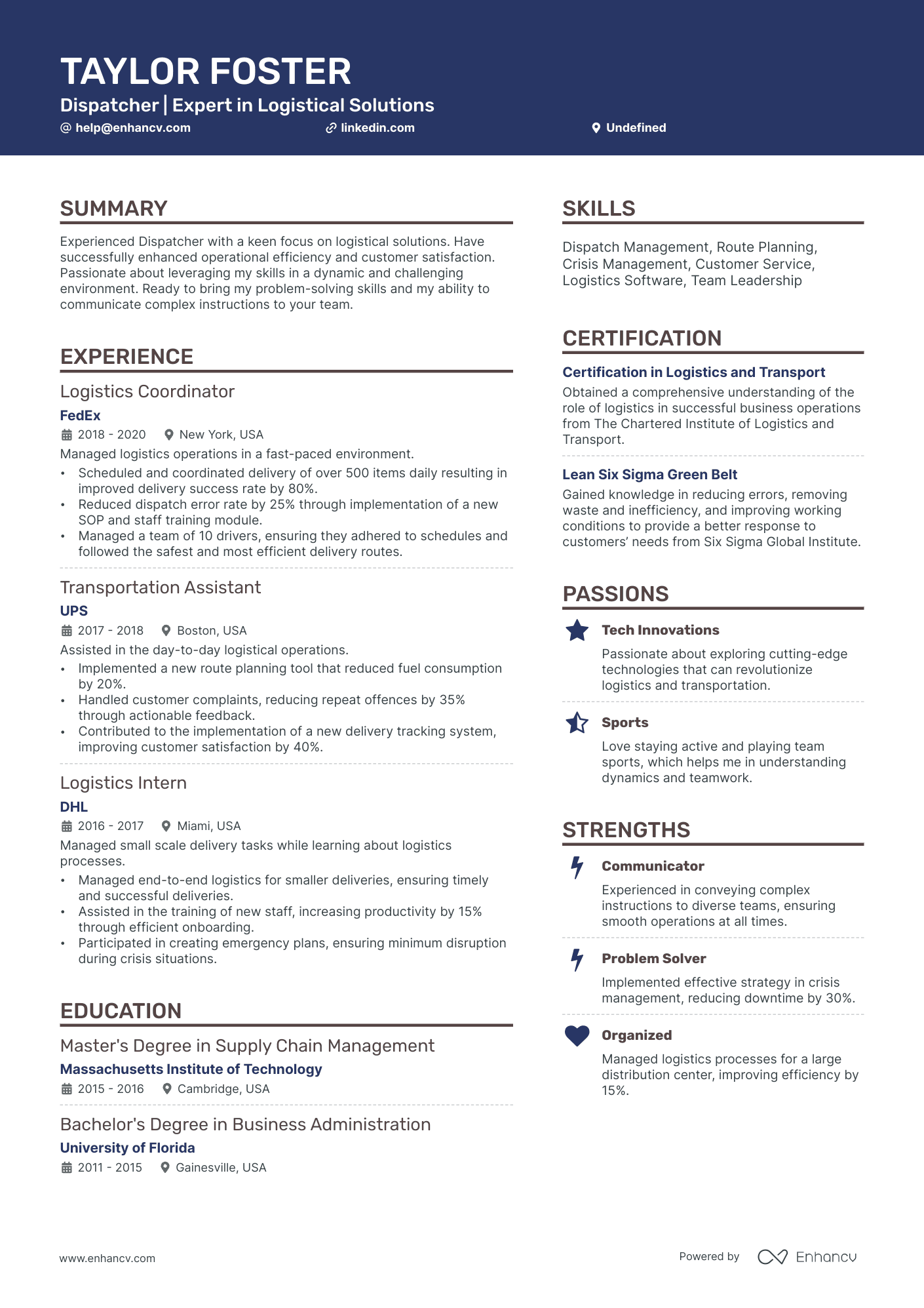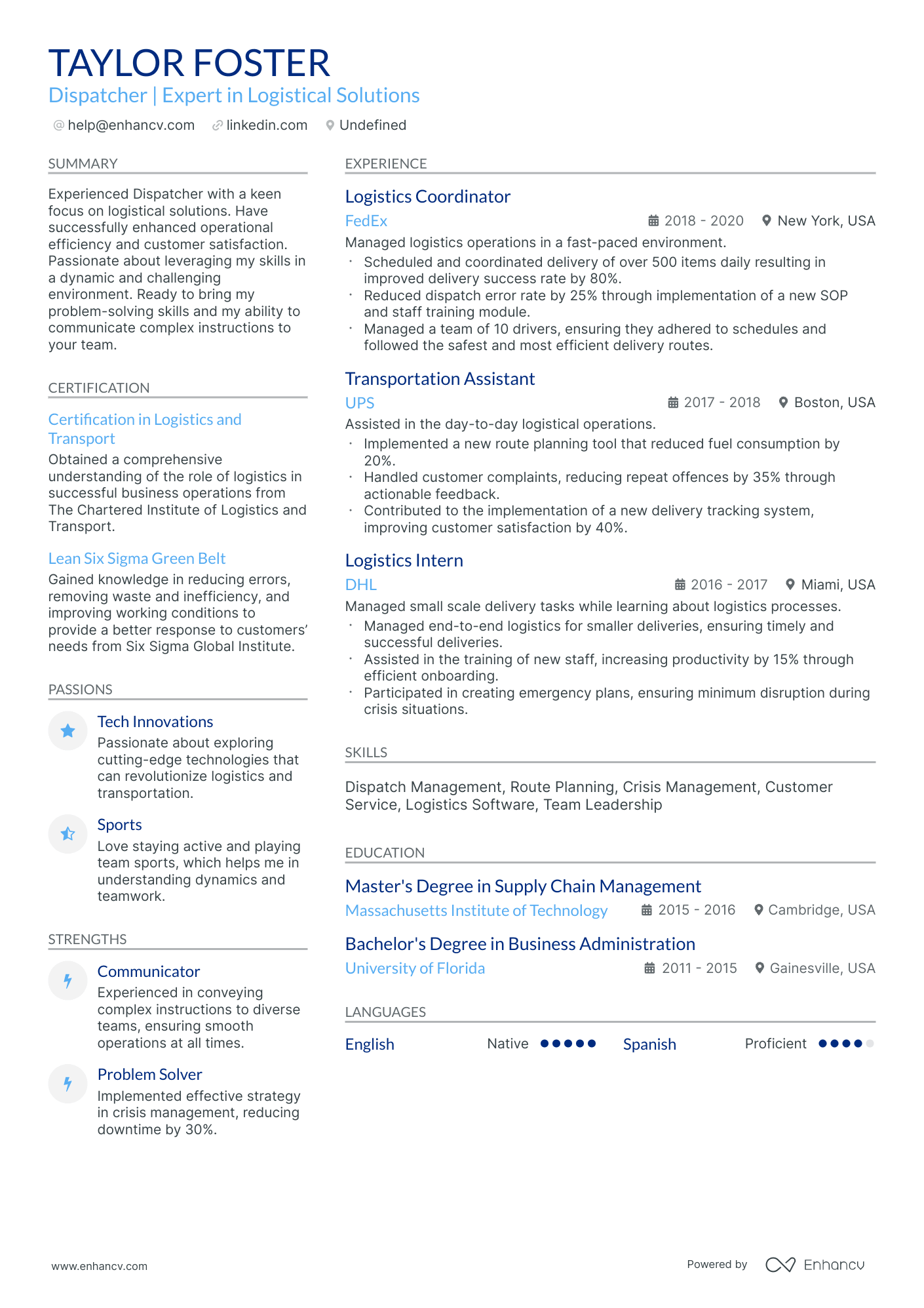An entry-level dispatcher may struggle with articulating their relevant skills and experiences due to lack of specific work history in the field. Our guide can assist by providing strategies on how to emphasize transferable skills from other jobs, education, or life experiences, and frame them effectively for a dispatcher role.
Here's what you'll read within our professional resume guide:
- Entry-level dispatcher resumes that are tailored to the role are more likely to catch recruiters' attention.
- Most sought-out entry-level dispatcher skills that should make your resume.
- Styling the layout of your professional resume: take a page from entry-level dispatcher resume examples.
- How to write about your entry-level dispatcher achievements in various resume sections (e.g. summary, experience, and education).
Recommended reads:
Designing your entry-level dispatcher resume: best practices
Before penning down your entry-level dispatcher resume, consider its structure and format. Here's what you should remember:
- Employ the reverse-chronological format to present your experience, starting with your most recent role.
- Your resume's header should feature accurate, professional contact details. If you maintain a professional portfolio or LinkedIn profile, include its link.
- Keep your resume concise, ideally within two pages. Prioritize relevance over length.
- Unless directed otherwise, save your resume as a PDF to preserve its design.
Upload your resume
Drop your resume here or choose a file. PDF & DOCX only. Max 2MB file size.
Pro tip
Your resume will likely be processed by an Applicant Tracking System (ATS). Ensure your header, summary, or objective incorporates essential skills required for the role.
Essential 911 dispatcher resume sections for a comprehensive overview:
- Header: Enables recruiters to swiftly access your contact details and peruse your latest work portfolio.
- Summary or Objective: Offers a snapshot of your career milestones and aspirations.
- Experience: Demonstrates alignment with job prerequisites and highlights your tangible contributions.
- Skills: Captures the full spectrum of your expertise, making you a compelling 911 dispatcher candidate.
- Education & Certifications: Bridges potential experience gaps and underscores your dedication to the field.
What recruiters want to see on your resume:
- Communication Skills: Since a dispatcher's primary role is to communicate effectively, recruiters often prioritize candidates with excellent verbal and written communication skills.
- Attention to Detail: The ability to handle multiple tasks simultaneously and maintain accuracy is crucial for dispatchers. Therefore, demonstrating strong attention to detail can make a candidate stand out.
- Problem-Solving Ability: Dispatchers often must make quick decisions under pressure. Recruiters look for individuals who have demonstrated good judgment and problem-solving abilities in past experiences.
- Experience with Relevant Software: Familiarity with dispatching software or similar systems can be a major plus. Candidates should highlight any relevant technical skills on their resume.
- Stress Management: Given the high-stress nature of the job, recruiters value candidates who exhibit strong stress management skills and the ability to remain calm in difficult situations.
Recommended reads:
Optimizing the experience section of your entry-level dispatcher resume
The experience section is pivotal—it bridges the gap between your qualifications and the job's requirements.
To craft an impactful entry-level dispatcher experience section, consider these guidelines:
- Review the job posting to identify key requirements and align your past roles with these needs.
- Go beyond listing skills—demonstrate their impact through quantifiable achievements.
- Exclude roles that don't enhance your application or showcase relevant skills.
- While technical expertise is crucial, also highlight soft skills that add value to your role.
- Use action verbs to articulate your accomplishments and the skills employed to achieve them.
Below, we've provided entry-level dispatcher resume samples to inspire your experience section, ensuring it adheres to industry best practices.
- Managed incoming emergency calls and dispatched appropriate emergency response teams effectively.
- Coordinated and monitored the movement of vehicles using GPS tracking systems, ensuring timely arrivals.
- Maintained accurate records of all incoming and outgoing communications to facilitate future reference.
- Collaborated with law enforcement agencies to provide real-time updates on emergencies and incidents.
- Implemented efficient scheduling techniques resulting in a 15% reduction in response time.
- Responded promptly to service requests from clients and efficiently dispatched field technicians.
- Utilized computer-aided dispatch systems to allocate resources and track service progress.
- Provided clear and concise instructions to field personnel, ensuring effective problem resolution.
- Assisted in the development of standard operating procedures to optimize dispatch operations.
- Managed a high volume of calls, achieving a 98% customer satisfaction rating.
- Monitored transportation routes and adjusted schedules to accommodate changing traffic conditions.
- Coordinated with drivers to ensure the timely delivery of goods to various locations.
- Utilized radio and communication devices to maintain constant contact with fleet drivers.
- Resolved logistical issues and provided alternative solutions to meet client requirements.
- Implemented a tracking system resulting in a 20% decrease in delivery delays.
- Managed a team of dispatchers and ensured the smooth flow of communication within the department.
- Coordinated with drivers, warehouse staff, and customers to optimize delivery routes.
- Implemented a new dispatch software system, resulting in a 30% improvement in efficiency.
- Developed and conducted training programs for new dispatchers to enhance their skills.
- Analyzed data and generated reports on key performance indicators to drive process improvements.
- Provided assistance and support to field technicians during service calls, ensuring timely resolutions.
- Maintained a comprehensive database of customer information and service history for reference.
- Coordinated with multiple vendors to schedule repairs and replacement parts.
- Identified recurring issues and collaborated with technical team to implement preventive measures.
- Streamlined communication channels, resulting in a 25% reduction in response time.
- Dispatched service personnel to residential and commercial locations to address equipment malfunctions.
- Prioritized emergency service requests based on severity and availability of resources.
- Delegated tasks to technicians and ensured they had the necessary tools and equipment for each job.
- Maintained constant communication with customers, providing updates on service progress.
- Implemented a call tracking system resulting in a 30% improvement in first-call resolution.
- Coordinated the dispatch of field service technicians for maintenance and repair tasks.
- Utilized a computerized maintenance management system to schedule and track work orders.
- Ensured compliance with safety regulations and proper utilization of personal protective equipment.
- Managed inventory levels of spare parts and supplies, optimizing cost and minimizing downtime.
- Implemented preventive maintenance programs resulting in a 15% decrease in equipment failures.
- Dispatched tow trucks and roadside assistance vehicles to aid stranded motorists.
- Coordinated with towing operators and service providers to ensure prompt response times.
- Maintained accurate records of service calls and billing information for administrative purposes.
- Responded to customer inquiries and provided updates on estimated arrival times.
- Implemented a routing optimization system resulting in a 20% reduction in average response time.
- Managed dispatch operations for a fleet of delivery vehicles, coordinating routes and schedules.
- Collaborated with drivers and warehouse staff to optimize load planning and maximize efficiency.
- Utilized a transportation management system to track shipments and provide real-time updates.
- Implemented driver performance metrics resulting in a 10% increase in on-time deliveries.
- Provided exceptional customer service, resolving any issues that arose during the delivery process.
- Dispatch and coordinate emergency vehicles in response to fire and medical emergencies.
- Maintain accurate incident logs and communicate with emergency personnel via radio systems.
- Provide pre-arrival instructions to callers for life-saving interventions before help arrives.
- Train new dispatchers on emergency protocols and maintain up-to-date knowledge on procedures.
- Implemented a computer-aided dispatch system resulting in a 20% reduction in response time.
Quantifying impact on your resume
<ul>
Strategies for candidates with limited resume experience
Lack of extensive experience doesn't mean you can't make a strong impression. Here's how:
- Thoroughly understand the role's requirements and reflect them in key resume sections.
- Highlight transferable skills and personal attributes that make you a valuable candidate.
- Use the resume objective to articulate your growth vision within the company.
- Emphasize technical alignment through relevant certifications, education, and skills.
Remember, your resume's primary goal is to showcase how you align with the ideal candidate profile. The closer you match the job requirements, the higher your chances of securing an interview.
Recommended reads:
Pro tip
Boost your resume by focusing on the practical aspects of each job requirement. While it's good to have job-related keywords on your resume, ensure they're backed by action verbs and quantifiable data. This gives recruiters a clear picture of your entry-level dispatcher professional journey.
Highlighting essential hard and soft skills for your entry-level dispatcher resume
Your skill set is a cornerstone of your entry-level dispatcher resume.
Recruiters keenly evaluate:
- Your hard skills, gauging your proficiency with specific tools and technologies.
- Your soft skills, assessing your interpersonal abilities and adaptability.
A well-rounded candidate showcases a harmonious blend of both hard and soft skills, especially in a dedicated skills section.
When crafting your entry-level dispatcher skills section:
- List up to six skills that resonate with the job requirements and highlight your expertise.
- Feature a soft skill that encapsulates your professional persona, drawing from past feedback or personal reflections.
- Consider organizing your skills into distinct categories, such as "Technical Skills" or "Soft Skills."
- If you possess pivotal industry certifications, spotlight them within this section.
Crafting a comprehensive skills section can be daunting. To assist, we've curated lists of both hard and soft skills to streamline your resume-building process.
Top skills for your entry-level dispatcher resume:
Computer Aided Dispatch (CAD) software
Geographic Information Systems (GIS)
Two-way radio communication
Microsoft Office Suite
Mapping software
Scheduling software
Database management
Vehicle tracking systems
Emergency response protocols
Telecommunications systems
Effective communication
Problem-solving
Multitasking
Attention to detail
Time management
Team collaboration
Adaptability
Stress management
Customer service orientation
Critical thinking
Pro tip
Targeting the needed job ad skills doesn't have to end with the skills section. You can talk about your related certifications, interests or additional experience via projects or volunteering, where you picked up those skills, too.
Highlighting certifications and education on your entry-level dispatcher resume
Your academic achievements, including certifications and degrees, bolster your application. They showcase your skills and commitment to the field.
To effectively present these on your resume:
- Highlight significant academic achievements or recognitions relevant to the role.
- Be selective; prioritize the most relevant and impressive certifications.
- Include essential details: certificate/degree name, institution, graduation dates, and license numbers (if applicable).
- Present your academic background in reverse chronological order, emphasizing the most recent and relevant qualifications.
For further guidance, explore popular industry certifications.
Best certifications to list on your resume
Pro tip
List your degrees in reverse order, starting with the newest. A recent PhD or unique field could set you apart.
Recommended reads:
Deciding between a entry-level dispatcher resume summary or objective
While some argue the resume summary or objective is outdated, these sections can effectively:
- Integrate pivotal entry-level dispatcher keywords.
- Showcase your achievements.
- Clarify your motivation for applying.
The distinction lies in their focus:
- A resume objective emphasizes your career aspirations.
- A resume summary spotlights your career milestones.
Opt for a summary if you have a rich experience you wish to highlight immediately. Conversely, an objective can be ideal for those wanting to underscore their aspirations and soft skills.
For inspiration, we've curated samples from industry professionals to guide your resume summary or objective crafting:
Resume summary and objective examples for a entry-level dispatcher resume
Detail-oriented individual with 3 years of experience in logistics, seeking to leverage my organizational and communication skills as an entry-level dispatcher. I have a proven record of managing dispatch operations for a mid-sized transport company, ensuring prompt service delivery and maximum customer satisfaction.
Accomplished professional with 5 years of experience in customer service roles, eager to apply transferable skills into the field of dispatch operations. Skills include problem-solving, quick decision-making, and exceptional interpersonal communication. Reduced response times by 15% in previous role through efficient scheduling.
Motivated graduate with a Bachelor's Degree in Business Administration, aiming to launch a career in dispatch operations. Highly skilled in multitasking, time management, and negotiation, and looking forward to applying these skills in a real-world setting to ensure efficient transportation services.
Experienced project coordinator with a background in construction, aiming to transition into dispatch operations. I bring forth strong organizational abilities, proficiency with dispatch software, and superior decision-making skills, honed over a 4-year tenure managing complex projects and tight schedules.
Seeking an entry-level dispatcher position to leverage my strong organizational skills, ability to work under pressure, and excellent communication skills to coordinate efficient transportation routes. I am committed to learning and growing in this field.
Aspiring to jumpstart my career in the transportation industry as an entry-level dispatcher. Offering excellent problem-solving skills, proficiency in dispatch software, and a strong desire to ensure the smooth operation of logistic processes.
Optimize your resume summary and objective for ATS
Drop your resume here or choose a file.
PDF & DOCX only. Max 2MB file size.
Four additional sections to consider for your entry-level dispatcher resume
To give a fuller picture of who you are, consider adding these sections to your entry-level dispatcher resume:
- Awards - to showcase your achievements.
- Interests - to share passions outside of work.
- Publications - to highlight your contributions to the field.
- Projects - to spotlight significant accomplishments, even those outside of traditional work settings.
Key takeaways
- Keep your entry-level dispatcher resume clear and organized with key sections.
- Only include relevant details. Space is limited.
- Support your achievements with both hard and soft skills.
- Detail your experience, focusing on your industry expertise.
- Highlight the most relevant certifications to show your dedication to the field.
